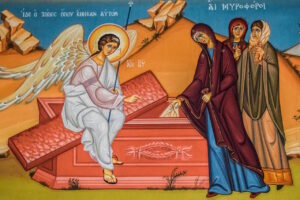Isaiah 7:10-14 (RM) or 10-16 (RCL); Psalm 24 (RM) or 80 (RCL); Romans 1:1-7; Matthew 1:18-24 (RM) or 18-25 (RCL.)
Two weeks ago, I was sitting contentedly in a wonderful concert of Christmas music at my German parish in Ottawa. The audience was invited to sing along with an old German Christmas hymn, one that I knew and had sung many times. But this time, one line jumped up and bit me:
Er kommt aus seines Vaters Schoβ und wird ein Kindlein klein
He comes from his Father’s womb and becomes a tiny child.
He came from – where?
The song was composed by Nikolaus Herman in 1554, but the expression goes back to the prologue of the Gospel of John, John 1:18. When St. Augustine got a hold of this text, he set it parallel with Psalm 110:3, “out of my womb, before the dawn, I bore you.” Much later, in the year 675, the Council of Toledo made it a mandatory point of doctrine:
“One must believe that the Son is begotten and born not from nothing, nor from some other substance, but from the womb of the Father [de Patris utero], that is, from his substance.”
In the King James version of the Bible the word in John 1:18 is translated as “bosom” of the Father and that’s what is commonly used today. To be fair, the German Schoβ can mean lap as well as womb.
Sitting in the concert, the phrase that came to me was “womb envy.”
In any case, our ancestors in faith were doing some serious, uh, gender-messing.
And this brings us through the back door to our First Reading and Gospel for this Sunday, the Fourth Sunday of Advent. Both of them focus on the female parent.
The thread that ties the two together has to do with Matthew’s interpretation of the human origin of Christ in a fulfillment of the prophecy declared by the prophet Isaiah to King Ahaz. Ahaz reigned over the southern kingdom of Judah and was under threat from an alliance of the northern kingdom with Syria. When Ahaz refuses to ask for a sign that everything would turn out well, Isaiah impatiently proclaims a sign anyway: that “the young woman [‘almah] will be with child and shall call his name Emmanuel.”
Commentator Reginald H. Fuller writes,
“It is probable that the young woman in question is the wife of the king, and the son to be born Hezekiah. The sign will then concern the continuation of the Davidic dynasty, a sign that God is with his people.”
So the original context had to do with the resolution of a political conflict and the belief that God would side with Judah.
Matthew and Luke used the same or similar source material, but shifted the original prophetic prediction to emphasize that Jesus was conceived by the power of the Holy Spirit, and that his mother was a virgin. They would have been using the Greek translation of the Hebrew scriptures, the Septuagint, in which ‘almah was translated into Greek as parthenos, a woman without sexual experience. But their real driving purpose was to declare that Jesus was not a product of human relations, but rather of divine origin, the result of a definitive intervention of God into human history.
Nonetheless, at the same time the evangelists place Jesus firmly in a male/female two-parent family. And nothing is said about Mary remaining a virgin in perpetuity.
So, our ancestors developed two discernible gender-based strands of interpretation to assert the divine origin of Jesus. Realistically, a person can only be born from one womb. We might say, one formulation is operating purely metaphorically and the other developed from the practical thinking of the early Church about the nature of Christ and how to explain (if that were even possible) how he could be both human and divine.
But something still bothers me, and that’s the level of discomfort with women’s bodies. Why do we sing at Christmas, “Lo, he abhors not the Virgin’s womb.” Abhors? Why should he?
I think I’m going to find Christmas carols much more interesting this year.
© Susan K. Roll
Susan Roll retired from the Faculty of Theology at Saint Paul University, Ottawa, in 2018, where she served as Director of the Sophia Research Centre. Her research and publications are centred in the fields of liturgy, sacraments, and feminist theology. She holds a Ph.D. from the Catholic University of Leuven (Louvain), Belgium, and has been involved with international academic societies in liturgy and theology, as well as university chaplaincy, Indigenous ministry and church reform projects.





Oh my, what a powerful reflection – thank you; and the level of discomfort with women’s bodies – a key question;
Wow! Could this be another attempt at trying to make women invisible? This is a painful part of church history for me.
I have been thinking more about Christmas carols since reading your article. As I paid attention, I was also reminded of the sexism of most lyrics. Like in “Hark the Herald Angels Sing”:
“Mild he lays his glory by,
Born that man no more may die:
Born to raise the sons of earth,
Born to give them second birth.”
These words can be fairly easily adjusted “born that we no more may die …” etc. But often words are not adjusted.
Still, God came, and keeps coming, to Incarnate in matter.